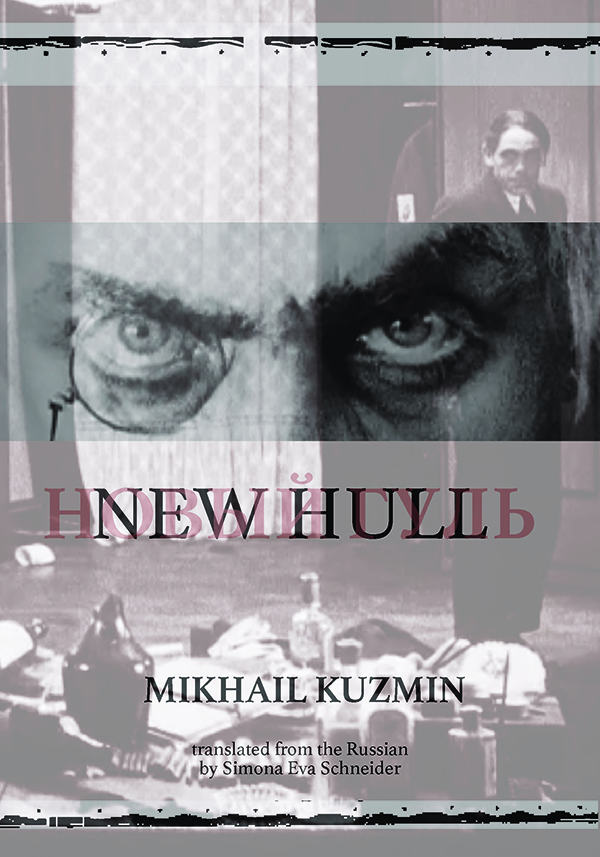Antiquity should be quite dead
to him who got it in his head to love You
and I am ready to call junk
all toupees and beauty marks,
Retrospective stage props
Lie as rag surplus
Today’s winged hours
Laughs from ringing eyes
While in the deep, undistorted,
my double’s faithfully bound tight.
I forgot all and see all,–
And find an Orbis Pictus.
Here Mozart, Hoffman, Goethe, Rome,–
All we love, and for which we burn,
isn’t cloaked in fog, but rather is as though
the wine of reminiscence spurts out. Here we go
with the Muse, again
recognizing love’s greenhorn
leads the devil through her palm…
spherical crackles the flame…
February 1924.

New Hull
Mikhail Kuzmin
Translated by Simona Schneider
October 2022
The poem is a haunted vessel, an astrologer’s portal.
Danny Snelson
Published as a chapbook 100 years ago, New Hull is a cycle of love poems by Mikhail Kuzmin (1872–1936), Russia’s first openly gay writer, in response to Fritz Lang’s film Dr. Mabuse, the Gambler (1922). The poem’s Orphic verse addresses the American playboy billionaire, Edgar Hull, wrestling him back from Mabuse’s oppressive gaze. Kuzmin’s elegy speaks to virtual world citizens, teasing media presence beyond passive-active viewing on a sleepwalker-spectator-dictator continuum, gently steering film plot and allegory into lyric song.
About the Author
Mikhail Kuzmin (1872–1936) was a poet most famous for writing Russia’s first openly-gay novel, Wings (1907), and his poem cycle, Trout Breaks the Ice (1929). Kuzmin is an over-looked but important figure: a multi-talented, multi-media writer whose work spans genre (prose, poetry, libretto, cinema), periods (Romanticism and Modernism), and two historical moments (before and after the Russian Revolution). He influenced the Acmeists with his manifesto “On Beautiful Clarity” (O Prekrasnoi Iasnosti) and was among poets like Osip Mandelstam confronting the potentials of the new medium of cinema in verse.
Praise
The poem is a haunted vessel, an astrologer’s portal. From hull to ghoul, Mikhail Kuzmin ships dashing actor Paul Richter in a slash poetics confounding supervillain Dr. Mabuse, the mechanism of cinema, Expressionist aesthetics, queer desire, and, above all, a love lost like sand on the wind, a transliterative shutter. Attending to spiritual tremors and eerie resonances with a finely-tuned prosodic divining rod, Simona Eva Schneider calls forth a hull/ghoul so new, you may even find yourself bound up on its atemporal prow.
Danny Snelson
Mikhail Kuzmin published poetry in the 1910s and 1920s. His modernist emphasis on the precision and concreteness of language and image proved an important influence on his friends Anna Akhmatova and Osip Mandelstam. He was also a major figure in Russia’s fairly open queer culture in the years of the Revolution. The cycle of poems translated here responds to Fritz Lang’s 1922 silent film Dr Mabuse, the Gambler, one of whose leads reminded Kuzmin of a former lover. To the difficult task of rendering Russian classical poetry in English, Simona Schneider brings a dedication to reproducing the poet’s own linguistic strategies.
Eugene Ostashevsky
About the Translator
Simona Schneider’s translations have appeared in Harper’s, The New Yorker, Literature Across Frontiers. She was a finalist for Three Percent’s prize for translations in Dmitry Golynko’s As It Turned Out (UDP). She is a media scholar and received a PhD in Comparative Literature with an emphasis in Film & Media from the University of California, Berkeley.
Links
As It Turned Out by Dmitry Golynko, tr. Rebecca Bella, Eugene Ostashevsky, and Simona Schneider
So It Is In Life by Daniil Kharms
Mohamed Berrada and Mohamed Choukri – A Correspondence, tr. Simona Schneider
Geoffrey G. O’Brien’s subjunctive ‘dividuals by Simona Schneider for Jacket2
Letter from a Valley by Simona Schneider
Simona Schneider reading at Holloway Series
New Hull launch and movie screening, June 18, 2023 at Anthology Film Archives
Publication Details
Chapbook
Hand-bound. 44 pp, 5.25 x 7.5 in
Publication Date: October 01 2022
Distribution: Asterism Books (US)
Series: none